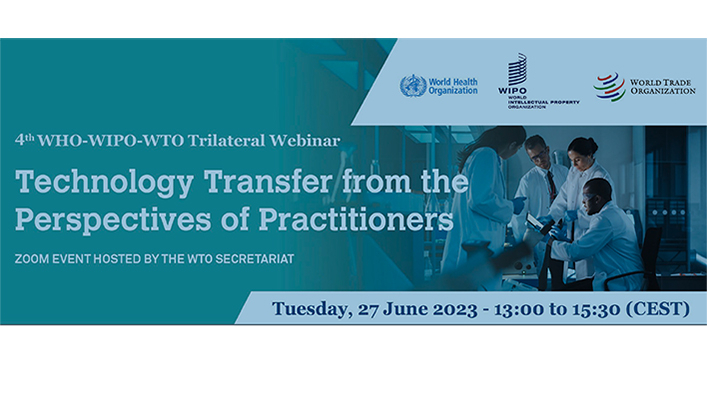
During the 4th trilateral webinar, four teams of technology providers and recipients shared their practical experiences and best practices for conducting technology transfer to developing economies to expand access to medical technologies. The experts shed light on the practical mechanisms in licensing agreements that facilitated the transfer of technology, know-how, and skills to enable local production of COVID-19 therapeutics, vaccines and diagnostics. The case studies helped achieve the webinar’s objectives of:
- Strengthening the capacity of policymakers and experts to understand the process of technology transfer in the area of health technologies in order to ensure better response and preparedness for future pandemics;
- Fostering a better understanding of the role of intellectual property and trade in relation to technology transfer, and examining the role of licensing and financing as part of the ecosystem for innovation, local production, and access to health technologies; and
- Providing a forum for exchanging experiences and views that can help the Secretariats of the WTO, WHO, and WIPO better respond to the capacity-building needs of their members and WTO accession candidates.
The webinar also explored financial mechanisms available to fund technology transfer in the health sector, including funding from governments, donors, private institutions, advance purchase commitments, public-private partnerships, and multilateral financing.
In his opening remarks, Antony Taubman (Director, Intellectual Property Division, WTO), underscored the widely felt need to understand the practical dimension of technology transfer as a critical requirement for more diversified production facilities, which in turn had been stressed by policymakers as a prerequisite for overcoming certain inequities in access to urgently required medical countermeasures.
Erika Duenas (Technical Officer, Access to Medicines and Health Products Division, WHO) emphasized the need to improve access to quality, safe, effective and affordable medicines and other health technologies, inter alia, through building capacity for local production, especially in low and middle-income countries, technology transfer for example through voluntary initiatives, such as the WHO COVID-19 Technology Access Pool (C-TAP) promoting generic competition to lower prices.
In her closing remarks, Amy Dietterich (Director, Global Challenges Division, WIPO) noted that the COVID-19 pandemic had spurred a great interest in technology transfer with a view to scaling up and diversifying manufacturing capacity to ensure timely, global, and equitable access to medical technologies. One of the most important takeaways was that “technology transfer is a collaborative and practical process connecting a large number of actors in the innovation ecosystem to achieve public health goals”.
More than 200 participants attended the webinar.
The programme and materials are available here.
Share
Reach us to explore global export and import deals